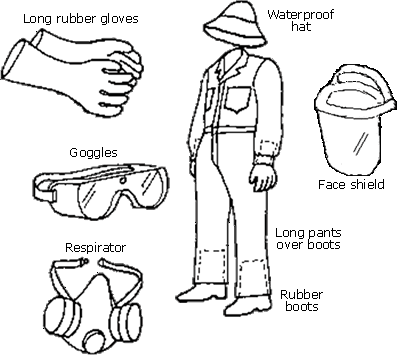All of us are familiar with the term ‘pesticides’. It is a general term that describes a very large and diverse group of chemicals or products that kill pests or prevent them from entering our places. In other words, pesticides help to reduce the damages caused by a pest. There are several safety tips for using pesticides The most common using pesticides are chemicals. They can also make from natural materials like plants, animals, bacteria, etc.
While using pesticides you have to be aware of all the safety tips for using them. Just like pesticides harm the pests unscientific use of them also harms humans and pets. So, if you have a large pest infestation it is better to call a pest control service center for a better solution. The New Star Pest Control in UAE is one of the best pest control companies that provide services across Dubai, Sharjah, Ajman, and Abu Dhabi.
Common types of pesticides
There are many different types of pesticides available in our market. Even though we are using them commonly, we are not aware of their type and purposes of them. Safety tips for using pesticides. Pesticides are formulated in liquid, solid and gaseous forms.
The liquid formulations of pesticides include suspensions, emulsifiable concentrates, solutions, and aerosols. Solid formulations of pesticides include specks of dust, pellets, granules, baits tablets, etc. The gaseous pesticides are typically fumigants.
Here gives a brief description of different categories of pesticides and their purpose. Just go through them to get a general idea about pesticides, which are a part of our daily life.
- Insecticides
- Herbicides
- Fungicides
- Rodenticides
- Disinfectants

Insecticides
The formulation of insecticide is to kill or repel or harm insects, ticks, and mites. They work on insects in different ways. Some of the insecticides disrupt the nervous system of insects and some may damage their exoskeleton.
Herbicides
Herbicides are used to kill weeds or inhibit the growth of unwanted plants. In the agricultural field, we commonly use chemical herbicides. It is more cost-effective than using mechanical weed control methods.
Fungicides
The purpose of fungicides is to kill or prevent the growth of molds, mildew, and other fungi. This will help to control fungi that damage the plants by damaging the fungal cell membranes. Sometimes it may interfere with energy production within fungal cells.
Rodenticides
Rodenticides are used to kill rodents such as mice and rats. It also kills squirrels, woodchucks, chipmunks, and nutria. These are usually formulated as baits to attract animals with the flavor of fish oil, molasses, or peanut butter.
Disinfectants
The disinfectant agents are formulations of quaternary ammonium compounds, iodophors, and chlorine-based biocides. The use of disinfectants helps to kill, destroy or inactivate bacteria, viruses, and also fungi.
Safe Pesticide Handling Methods
We use pesticides commonly to kill and remove pests. So, the chemicals in it will also harm people who use them. While handling pesticides always make sure to be aware of the safety tips for using pesticides to avoid direct contact with them.
Using pesticides safely depends on many things like selecting the appropriate product for your problem and using the product according to the directions given on the label. In every chemical product, we can see a label that gives directions to use which helps to minimize the risk of problems.

The careless usage, storing, and mixing of pesticides cause harm to us and our environments. So, follow the safety tips for using pesticides while handling the chemical pesticide.
- The first and foremost thing is to read and follow the label directions including all precautions and restrictions.
- Make sure that kids, pets and other people who are not needed to the process is out of the area. Also remove sources of food and water from that area.
- Store the pesticide in a temperature-controlled environment.
- While mixing the pesticides choose ventilate area, use recommended rate only and keep the mixing container below eye level.
- Apply the pesticide only at recommended dose. Never use additional pesticide for an increased effect.
- Wear appropriate personal protective equipment such as gloves, long pants and full sleeve shirts, boots, face shield and goggles. It is to protect your nose, eyes, mouth, ears and also hands.
- Never use the containers, buckets and other equipment uses for pesticides for a domestic purpose.
- Wash skin and change the clothes after using the pesticides with soap or body liquids. Also discard contaminated leather boots, shoes and belts.

